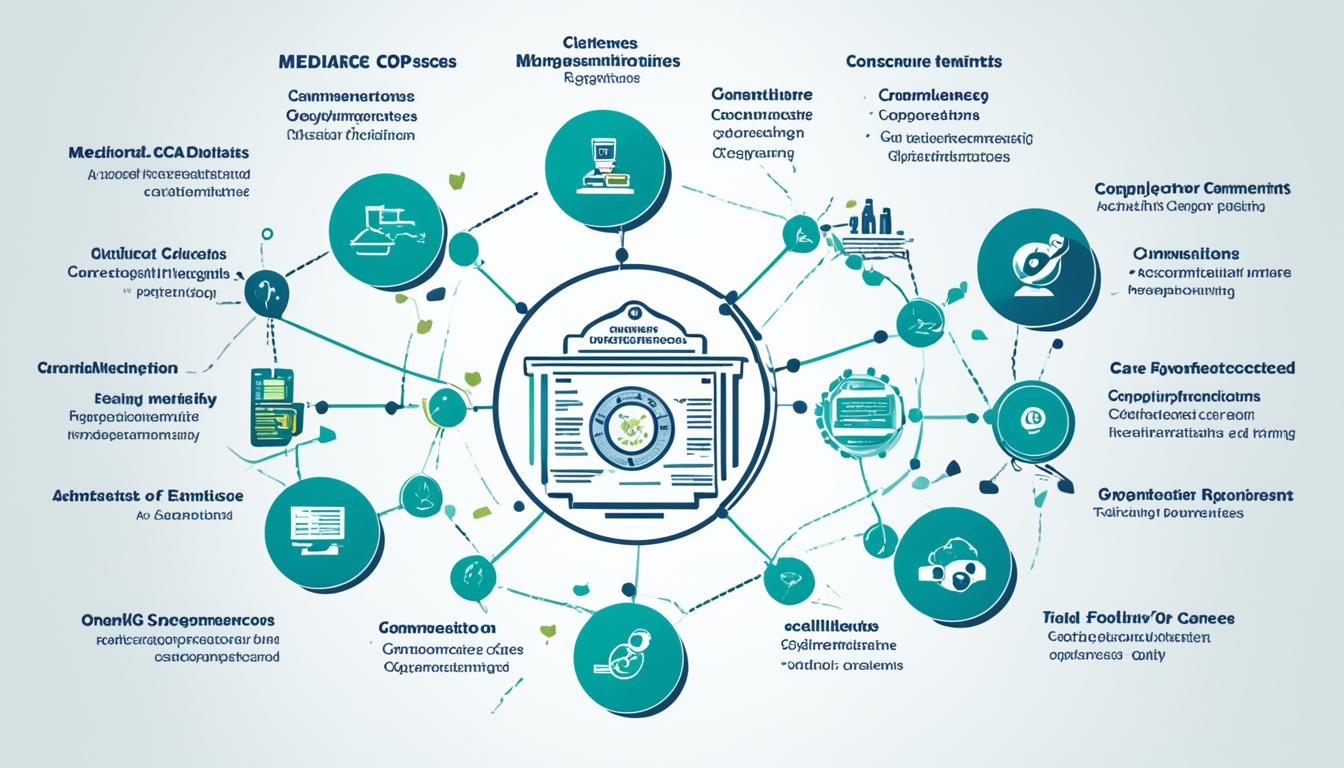Understanding Medicare CoPs Regulations
Did you know that over 10,000 organizations follow Medicare Conditions of Participation (CoPs)? These rules are vital for quality healthcare for millions. They are created by the Centers for Medicare & Medicaid Services (CMS). These regulations set standards for healthcare providers. By following them, hospitals can get federal payments and ensure patient safety and rights.
It’s crucial to keep up with Medicare CoPs guidelines and follow the compliance requirements. These rules change to match new healthcare needs. A CoPs survey checks if healthcare facilities meet high standards. To pass this survey, facilities need to know and follow the rules in the Medicare CoPs manual.
For healthcare organizations, CoPs accreditation is a sign of their promise to provide excellent patient care. Being compliant means improving and updating standards. This is important to handle new challenges in healthcare.
Key Takeaways
- Over 10,000 healthcare organizations are regulated under the Medicare CoPs.
- CMS CoPs stipulate the quality and safety standards essential for patient care and provider compliance.
- The CoPs survey process is instrumental in ensuring adherence to federal health care standards.
- CoPs regulations continually evolve, requiring ongoing attention and adaptation by healthcare providers.
- CoPs accreditation standards reflect a healthcare organization’s dedication to quality patient care.
Introduction to Medicare Conditions of Participation
The Medicare Conditions of Participation (CoPs) set high standards for healthcare. They are established by the Centers for Medicare & Medicaid Services (CMS). These rules ensure patient safety and quality of care in healthcare organizations.
CoPs are key to enforcing quality healthcare across the nation. They protect patient rights and guide healthcare providers. Not following these rules can lead to being banned from Medicare and Medicaid, which many healthcare entities depend on.
Let’s look at a table that explains CoPs better. It shows the main points and goals of these standards:
| Key Element | Objective | Outcome |
|---|---|---|
| Patient Rights | Ensure patients are fully informed and can make their own care decisions. | Patients are happier and make better health decisions. |
| Quality of Care | Ensure care is safe, effective, and focused on patient needs and outcomes. | Healthcare services and patient outcomes improve. |
| Governance | Set operational rules and accountability in healthcare organizations. | Organizations are well-managed and meet health standards. |
| Staffing and Personnel | Keep enough skilled staff for quality patient care. | The workforce can give full patient care. |
| Quality Assessment and Performance Improvement (QAPI) | Always work to enhance healthcare and patient results. | Healthcare constantly improves and aims for excellence. |
CoPs are enforced through surveys and inspections by state or CMS-approved groups. These surveys make sure providers meet standards and improve care quality. CoPs protect patients and push for better healthcare.
The Evolution and Importance of Medicare CoPs
The healthcare scene has greatly evolved over the years. So have the Medicare Conditions of Participation (CoPs). These rules are key for keeping patient safety and care quality high. They make sure health agencies follow the latest healthcare rules. This sets a standard for great and honest patient services.
Historical Perspective on Medicare CoPs
In the beginning, Medicare CoPs focused more on how healthcare facilities were built. They set rules for who could work there and what kind of policies were needed. This was important but didn’t fully address how care was given or its results.
The Shift from Structure to Performance and Outcomes
Now, Medicare CoPs care more about how patients improve and their care experience. Health places must focus on how well patients recover. This change helps ensure that care quality shows through real, positive outcomes for patients.
Impact of Regulatory Changes on Health Agencies
New rules mean health agencies have to update how they work. Adapting to these changes is crucial. It affects everything they do. Those who don’t keep up face losing their certification. This can lead to major money and reputation problems.
| Year | Regulatory Focus | Impact on Health Agencies |
|---|---|---|
| Initial CoPs Era | Structural Requirements | Emphasis on Staff Qualifications and Policies |
| Modern CoPs Transition | Performance and Outcomes | Shift Towards Quality of Care and Patient Outcomes |
The changes in Medicare CoPs over time aim to better healthcare standards. These rules put patient safety and care quality first. They drive health agencies to embrace these important values in everything they do. This benefits everyone involved in healthcare.
Medicare Conditions of Participation (CoPs)
The healthcare regulations in the U.S. have a strong base in the Medicare Conditions of Participation (CoPs). These rules make sure healthcare places meet high standards of patient care and work well. CMS compliance means going through many rules that cover all parts of treating and caring for patients. This makes sure the care and safety in medical services are top-notch.
Key parts of CoPs focus on making patient care better. This includes protecting patient rights and making sure admin work is strict. So, CoPs create a standard of care for those under Medicare and Medicaid. This shows a deep commitment to providing health services that are good, careful, and fair to all.
The role of following the Medicare Conditions of Participation is very important. They are key rules for healthcare workers and places, affecting patient care quality directly.
Accompanying the textual guidance is a crucial visual representation:
Now, let’s talk about what CoPs cover and how to make sure you’re doing things right:
- Patient Care: Being great at diagnosing, treating, and following up.
- Administrative Efficiency: Making sure admin tasks are done right and responsibly.
- Patient Rights: Making sure patients’ rights to privacy, consent, and information are respected.
- Quality Improvement: Always working to make healthcare better through reviews and changes.
For health places, following CMS compliance means they can get federal money. It’s key to match up with CoPs. To achieve this goal, a deep knowledge and true use of the rules are needed. Plus, a strong focus on always getting better. This way, an organization shows it really upholds the Medicare Conditions of Participation. And, it promises to give the best healthcare.
Requirements for Home Health Services Under CoPs
Those who rely on home health services find guidance in the Medicare Conditions of Participation (CoPs). They ensure healthcare meets high standards. The CoPs outline what good patient care should look like, following strict healthcare regulations.
Components of Required Home Health Services
The CoPs provide a detailed plan for what home health agencies must offer. These services are crucial for patient health at home. They include:
- Skilled nursing care
- Physical, occupational, and speech therapy
- Medical social services
- Home health aide competency
- Administration of medical supplies and equipment
Revisions Impacting Interdisciplinary Care Approaches
Recent changes to the CoPs highlight the need for interdisciplinary care. This approach improves patient results. It brings together different healthcare experts to provide comprehensive, focused care.
| Service Component | Importance in Interdisciplinary Care |
|---|---|
| Skilled Nursing | Leadership in care plan development |
| Therapies | Supports patient’s functional recovery |
| Medical Social Services | Helps address social determinants of health |
| Home Health Aides | Assists with daily living activities and ensures care continuity |
| Medical Supplies | Enables necessary treatment within home environment |
These care elements work together under the CoPs, focusing on patient wellbeing. Each change in the CoPs aims at better, compassionate home health care. It’s a move towards holistic, advanced patient support.
CMS CoPs Compliance Requirements
Following the Medicare Conditions of Participation (CoPs) is a must for healthcare facilities. They need this to take part in the Medicare and Medicaid programs. The Centers for Medicare & Medicaid Services (CMS) set important rules. These affect the way organizations work, their clinical approaches, and their finances. Being compliant with CMS is key to providing continuous and quality care.
Repercussions of Non-compliance
Not meeting CMS CoPs can lead to big problems. These include financial penalties and operational limits. Facilities found not following the rules may need to fix things fast. They might even get more checks or, in the worst case, get kicked out of federal health programs.
The Critical Role of Corrective Action Plans
If a healthcare organization slips up, CMS asks for a corrective action plan. These plans help fix and stop further issues. They show that an organization is serious about following rules and can manage their responsibilities well.
| Compliance Criterion | Repercussions for Non-compliance | Corrective Action Plan Focus |
|---|---|---|
| Quality of Patient Care | Monetary sanctions, possible temporary management appointment | Enhance training, revise procedures |
| Administrative Oversight | Increased surveillance, potential funding holds | Streamline governance, reinforce policy adherence |
| Facility and Staff Requirements | Citation, required staff requalification | Update facility, credential review |
| Patient Rights and Safety | Legal action, potential exclusion from Medicare CoPs | Implement safeguards, policy revision |
Staying on top of CMS compliance is an ongoing task. With careful attention and deep knowledge of the Medicare Conditions of Participation, healthcare groups can manage these rules. They protect against non-compliance risks. And they get to improve the care they give to their patients.
Medicare CoPs Guidelines for Improved Patient Care
Medicare Conditions of Participation (CoPs) are key for better patient care in healthcare facilities. These rules help healthcare evolve, focusing on the patient’s own health journey. They make sure care centers on the patient and that quality checks are thorough. This way, patient needs lead, and improving care is a must.
Patient-Centered Care Requirements
Medicare CoPs demand care that puts patients first. It sees each patient as a key part of their care team. Their needs and what they want matter in care decisions. This leads to care that listens and respects each patient’s wishes.
Quality Assessment and Performance Improvement
A core part of Medicare CoPs is improving care quality. Healthcare places must track data and use it to get better results. They always aim to do better in giving top-notch patient care.
| Aspect of Patient Care | CoPs Requirements | Goals for Improvement |
|---|---|---|
| Individual Care Plans | Patient-centered planning | Enhance personalization of care |
| Health Outcomes | Continual monitoring and reassessment | Improve patient health status |
| Care Coordination | Interdisciplinary approach | Streamline care delivery |
| Patient Engagement | Active involvement in decision-making | Empower patients and caregivers |
| Staff Training | Ongoing education | Boost competence and care quality |
Following Medicare Conditions of Participation is crucial in healthcare. It helps providers deliver care that is both thoughtful and excellent. This sets the standard for the best care today.
Understanding the CoPs Survey Process
The survey process is key in making sure healthcare organizations meet Medicare Conditions of Participation (CoPs). These inspections are crucial for keeping up with healthcare regulations. Each survey thoroughly checks if organizations meet federal standards. This is done through visits by surveyors from state agencies or CMS-approved groups.
During a survey, different things related to compliance verification are checked. This includes how well patients are cared for, how well the organization is run, and if it follows CoPs. Understanding what the survey looks for helps organizations prepare for these important checks.
| Survey Focus Area | Details Evaluated | Examples of Compliance Verification |
|---|---|---|
| Patient Rights | How well patients are informed about their rights and care plans | Documentation of patient consent and privacy policies |
| Quality of Care | Assessment of patient care quality and outcome measures | Review of patient treatment records and care coordination |
| Governance and Administration | Effectiveness of the organization’s leadership and management | Evaluation of governing body and administrative protocols |
| Physical Environment | Safety and suitability of the facility for patient care | Inspections of safety drills and environmental services |
| Staff Qualifications | Verification of staff credentials and ongoing education | Examination of staff licenses and training programs |
The survey process is a test of how well an organization can provide top-notch care. It’s also a chance to show a deep commitment to quality. By taking the Medicare Conditions of Participation seriously, healthcare providers can do more than just meet standards. They can improve and offer better care to patients.
The Connection Between CoPs Regulations and Accreditation Standards
There’s a critical link between Conditions of Participation (CoPs) and accreditation standards. This connection is crucial for healthcare organizations to offer compliant, high-quality care. Accrediting bodies serve as key intermediaries. They ensure that healthcare delivery meets the high standards set by state and federal agencies.
Role of Accreditation Bodies in CoPs Compliance
Organizations like The Joint Commission are vital in aligning healthcare facilities with CoPs. They conduct thorough surveys and assessments. This confirms an organization’s commitment to the high standards of CoPs. Accreditation groups focus on patient safety, care coordination, and patient rights. These areas are central to the accreditation effort.
State and Federal Oversight of Accrediting Organizations
State and federal oversight ensures accrediting bodies maintain their integrity. It keeps them effective in upholding CoPs regulations. This government involvement means standards are always evolving. They change to match the needs and services of modern healthcare.
| Accrediting Organization | Survey Focus Areas | Compliance with CoPs |
|---|---|---|
| The Joint Commission | Patient rights, treatment, and safety | Checks alignment with Medicare CoPs |
| DNV GL Healthcare | Quality performance, risk management | Evaluates adherence to national standards |
| Commission on Accreditation of Rehabilitation Facilities (CARF) | Program effectiveness, consumer satisfaction | Assesses compliance with industry best practices |
| American Osteopathic Association (AOA) | Clinical practice, healthcare outcomes | Monitors alignment with osteopathic principles in care |
The hard work of accrediting bodies and oversight by the government helps maintain healthcare compliance. This partnership helps the healthcare system flourish. It creates a space where patient care and safety are of utmost importance.
How to Achieve CoPs Accreditation Standards
Getting CoPs accreditation standards requires both knowledge and adherence to detailed healthcare regulations. This goal is not just about meeting the rules. It’s about adopting a quality, patient-first approach in care. Achieving this standard shows a commitment to quality and gets federal support for healthcare providers.
Eligibility and Reimbursement Criteria
To be accredited, healthcare groups must meet eligibility criteria linked to Medicare’s Conditions of Participation. They also need to satisfy reimbursement criteria to receive proper financial payments for their services. Getting this balance right showcases a commitment to both compliance and excellence.
Cost and State Recognition of Accreditation
The cost of gaining accreditation can differ widely. It depends on the healthcare organization’s size and type. Getting recognized by state agencies adds another layer, as requirements vary across states. This means organizations must understand and follow their state’s specific rules to stay accredited.
Here’s a detailed table highlighting the key aspects and their importance for CoPs accreditation standards:
| Accreditation Factor | Details | Considerations for Healthcare Organizations |
|---|---|---|
| Eligibility Requirements | Adherence to Medicare Conditions of Participation | Establish robust compliance systems and regular self-assessment |
| Reimbursement Protocols | Criteria to receive federal payment | Efficient billing and coding practices |
| Cost Considerations | Varies by organization size/type | Allocate budget for accreditation expenses |
| State Recognition | Required accreditation for licensure/certification | Stay informed on state-specific accreditation policies |
Conclusion
In healthcare, the Medicare Conditions of Participation (CoPs) guide organizations to high patient care standards and compliance. These rules help providers ensure top-quality service, focusing on patient well-being and rights. Following the CoPs means doing more than just meeting federal rules.
It’s about improving healthcare delivery through excellence and ongoing quality boosts. For organizations, following the CoPs is crucial for Medicare and Medicaid. It also promotes safety and responsibility. By doing so, care for patients stays top-notch, valuing each person’s needs and leading to better health results.
The CoPs get updated to match healthcare progress, pushing organizations to keep up and adopt growth-supporting practices. By adopting the CoPs principles, providers can tackle modern health challenges effectively. Their commitment leads to improving care, which results in happier patients and better outcomes. Healthcare groups dedicated to the CoPs will excel in providing outstanding care in this fast-changing sector.
FAQ
What are Medicare CoPs regulations?
Who oversees and enforces the Medicare CoPs?
What are the Medicare Conditions of Participation (CoPs)?
What is the historical perspective of Medicare CoPs?
What areas do the Medicare CoPs cover?
What are the requirements for home health services under CoPs?
What happens if a healthcare organization does not comply with CoPs?
What is the role of corrective action plans in CoPs compliance?
How do the Medicare CoPs guidelines improve patient care?
What is the CoPs survey process?
What is the connection between CoPs regulations and accreditation standards?
How can healthcare organizations achieve CoPs accreditation standards?
Source Links
- https://www.healthstream.com/resource/blog/what-are-conditions-of-participation-(cops)
- https://www.federalregister.gov/documents/2017/01/13/2017-00283/medicare-and-medicaid-program-conditions-of-participation-for-home-health-agencies
- https://www.jointcommission.org/resources/news-and-multimedia/fact-sheets/facts-about-federal-deemed-status/







